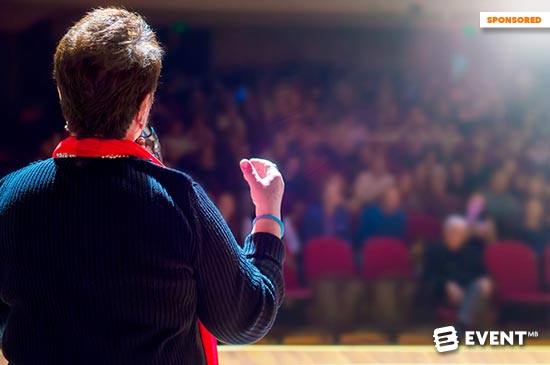Skift Take
Content curators aren’t born, they are shaped by their successes and failures, the lessons they learn and how they adapt. To help you accelerate your journey, here are some insider tips from one of the best - Fenella Kernebone – Head of Content for TEDxSydney.
This is a sponsored post written by Miranda Carter, Director of Marketing at etouches Asia Pacific. More information about Event Manager Blog’s sponsored posts.
Event content can be the highlight or the hell of a business event. It can be the glue that holds it all together. It can be fun and frivolous. You can suffer the triple threat of boredom, repetition and inanity, or it can be the moment that transforms an attendee’s day from ordinary to extraordinary.
The most powerful event programmes aren’t a result of the biggest budget; they are the product of an event content manager who knows how to get the best from the agenda items they can’t change, and can source a talent mix, structure a programme, workshop ideas, coach the talent and cajole a programme into a living, breathing powerful thing.
According to TEDxSydney’s Head of Curation – Fenella Kernebone – there is no ‘golden rule’, but she has some insider tips that could be the difference between your next event being good, great, or unforgettable.
Why Are We Here?
Before we start with any content magic, firstly we need to remember why we are running an event in the first place. After all, we are so digitised we order our coffee, book our holidays, do our banking, our business and our relationships online, so why are we still bothering to meet face to face? This is straight to the heart of the matter… a shared experience will expedite the development of a relationship beyond anything we can replicate through technology. That’s right, despite the economy, convenience, and collaboration that tech now affords us, we are still humans and we still crave, perhaps more than ever, those human connections. Perhaps that is one of the reasons why business events are experiencing a global boom. Even us techies are holding more face to face events year on year.
Unleash The Content Superpowers
Business events frequently use their content programmes as a filler, a time marker, a single bright spot of bling, or more habitually as a value-add platform for sponsors. These are all viable, but left to their own devices severely limit the opportunities for your audience to elevate their experience of your event from mundane to magnificent. Smart business marketing taps into our behaviour drivers, and the most powerful and controllable way to build crowd energy is via your content. Whilst your programme may be manufactured, the chemistry it can produce in an audience is totally authentic.
Every event, no matter how big or small, has the potential to feed participants’ hunger for information and idea sharing. Crowdsourcing, ideation events and online collaboration platforms are home to conversations that are changing business. If you can underpin your content programme with that same sense of discovery and creation then you are building a super-powered programme that people will continue to talk about and may even deliver that ‘Eureka!’ moment.
The Shift – From Content Manager To Curator
I’ve heard talks that would make a bikie blush, cried until my mascara ran into my iBook and yawned my way through hours of drivel. Music, theatre, thought leadership keynotes, storytelling, comedy, panel discussions, artistic performances and product promotions regularly make up the landscape of an event. A curatorial mindset lies in taking responsibility for the talent preparedness, the shape, the flow, and the framing of each act and how it contributes to the overall dynamic. Yep – even those sponsored speaking slots!
So now you know the onus is on you, don’t be afraid to have strict criteria for content topics, stringent deadlines, and if needs be, a rehearsal agenda. Remember a rehearsal can always be done online. Consider investing in a performance coach for just one session with each speaker – they go away with some valuable new skills and it could transform the audience’s level of engagement and value perception of your event.
Making Your Event Memorable – Tips from a TEDx-pert
Content curator Fenella Kernebone is the Head of Curation for TEDxSydney, responsible for leading the programming for what has become one of the largest TEDx events in the world, and managing a team of over 20 curators and producers. She shared some of the secrets to creating a world-class content programme:
Finding New Talent
How do you keep it fresh?
- Research: It may be that there is a popular expert everyone uses who talks about a particular topic – but through a process of research, it will become apparent that there is likely to be a number of others who may be able to offer a different perspective. Think broadly and search widely.
- Media: Pick up magazines and newspapers that you might not normally come across – including industry magazines.
- More media: Podcasts and radio interviews are an excellent way to source talent.
- Ring people: Get on the phone. Call someone up and have a conversation – ask for their recommendations.
How do you minimise the risk of a new act failing?
- Communicate: If the goals of the event/conference have been adequately communicated, then there is less risk when considering new talent.
- Review in advance: Let them know what you expect from them and what they should be speaking about and if needs be, ask for drafts/outlines of their talks in advance.
- Rehearse: TEDxSydney actively seek out speakers who may not have been heard before on any stage. Each speaker works with a curator who helps them prepare their talk and helps them rehearse so that they are stage ready. This process is as important for the speaker preparation as it is for us.
Scheduling Performers
How important is the order of the performers/presenters?
- Mix it up: A mix in the schedule will keep the audience engaged and focused.
- Keep them at the event: Scheduling highlights towards the end of the day and at the start is a great way to engage the audience. It also helps to get people there on time and to stay to the end!
- Diversity: Consider the mix of presenters themselves … make sure you have a diversity of ideas and backgrounds on stage and in panels.
- Avoid: being listed on this site! https://allmalepanels.tumblr.com/
- Create debate: A provocative talk or a presentation that is exciting or new, programmed just before a break, can be a powerful way to encourage conversation and debate during the break.
- Attention grab: Performers can be a great way get people’s attention back after a break.
Performance Enhancement
How can a planner help a business presenter improve their performance?
- Storytelling: The importance of storytelling cannot be stressed enough. Weaving stories throughout a talk can do wonders when it comes to engaging people… and they are more likely to remember the talk and the key points.
- Minimal slides: If they must use slides, make sure they’re worth it.
- Provide a good brief: Will they be speaking to a large room of people within one industry, or will it be a broad audience? If a presenter knows their audience, they can tailor their talk and language appropriately.
- Get to the point: Speakers often start their talks listing their credentials but if people are really interested, they could simply look at the program and read the biography.
- Plan and rehearse: TEDxSydney speakers go through numerous drafts of their talks before they go on stage. Speakers need to plan their talk coherently so that their key points and main message come through clearly. Draft out a strong introduction and conclusion and commit it to memory.
- Allow enough time: Give speakers adequate time to rehearse if they need it and to set up. At TEDxSydney we arrange rehearsals well in advance of the main event as well as on site rehearsals. These are vital – as it means the last few weeks are simply about rehearsing and not writing.
What if a performer/presenter refuses help or rehearsal?
- Set expectations: Communicate the goals clearly from the outset so the speakers know exactly what is expected of them.
- Self check: Ask them if they were speaking to an audience that had knew nothing about their topic – would they be engaged?
Administration Must Have
What tool will ease the burden of an event content manager?
- Slack is a great tool for communicating between team members. It reduces the quagmire of the email inbox with private messaging and multiple messaging channels.
The TEDx’s Must-Do List For Every Event
- Acknowledge/welcome to country
- Plan early
- Know the purpose of the event and know your audience
- Surround yourself with smart people who understand your goals
- Don’t forget to leave space for unexpected moments … a little breathing room in the schedule and program. Things will change.
In Conclusion
Business events, tradeshows, roadshows, conferences and meetings all vary in almost every way imaginable – budget, scale, attendees, location, and especially goals. Irrespective of these variables, at the heart of a successful event is a content programme that has been curated with one underlying brave question in mind… ‘how can our content elevate the attendee experience’?






